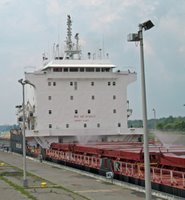 I got there in time to see her enetering the lock. Birchglen proved to be a new style Great Lakes bulk cargo carrier, or "laker", in that she has both her bridge and engine room aft instead of having a separate wheelhouse and crew quarters perched on her bow (compare with the photos of Frontenac in my earlier post linked above). In this respect, she looks like a typical oceangoing bulker; her laker pedigree is proclaimed by her very rounded bow, which contrasts with the sharper-edged stem of a typical "salty", and her relatively narrow beam compared to her length, which enables her to fit the Seaway locks.
I got there in time to see her enetering the lock. Birchglen proved to be a new style Great Lakes bulk cargo carrier, or "laker", in that she has both her bridge and engine room aft instead of having a separate wheelhouse and crew quarters perched on her bow (compare with the photos of Frontenac in my earlier post linked above). In this respect, she looks like a typical oceangoing bulker; her laker pedigree is proclaimed by her very rounded bow, which contrasts with the sharper-edged stem of a typical "salty", and her relatively narrow beam compared to her length, which enables her to fit the Seaway locks.
To the right is a closer view of Birchglen's bow, revealing a sloppy paint job covering raised metal letters spelling out her earlier name, Federal Richelieu. Sailors used to consider it bad luck to sail on a vessel if its name had been changed. Today, it is rare to find a merchant ship more than five years old that hasn't had its name (and probably its ownership) changed at least once. In fact, Birchglen was launched in 1983 as Canada Marquis, sailed under that name until 1991, when she became Federal Richelieu, had her name changed again to Federal MacKenzie in that same year (ironically, the name she bore for the shortest time is the one memorialized in raised lettering), stuck with Federal MacKenzie for ten years until becoming simply MacKenzie for the period 2001-02, then was given her present name. No wonder her owners, Canada Steamship Lines Inc., don't worry too much about the neatness of the paint job. As a lawyer, I assume this name-changing mania is driven by tax considerations, this being what seems to be behind any seemingly economically nonsensical business activity. (Information on the name chages comes from the very useful Know Your Ships: Guide to Boats & Boatwatching, Great Lakes & St. Lawrence Seaway, published by Marine Publishing Co., Inc. of Sault Ste. Marie, Michigan, and available at the Eisenhower Lock Visitor Center gift shop.)

 These photos show Birchglen's superstructure in a full lock (having come in from the west), and after the lock has emptied to the level of the Seaway downstream. This lowering of a 35,000 deadweight ton vessel (or raising of a vessel going in the opposite direction) is accomplished by the force of gravity; the only electric energy used is that needed to open and close a couple of valves.
These photos show Birchglen's superstructure in a full lock (having come in from the west), and after the lock has emptied to the level of the Seaway downstream. This lowering of a 35,000 deadweight ton vessel (or raising of a vessel going in the opposite direction) is accomplished by the force of gravity; the only electric energy used is that needed to open and close a couple of valves.
Finally, we see Birchglen, having left Eisenhower Lock, sailing down the St. Lawrence toward her destination, Quebec City, where her cargo of grain will either be transshipped onto oceangoing vessels for transport overseas, or, perhaps, be milled into flour to make baguettes for hungry Quebecois.
Update: Alert reader (and friend) Ellen tells me by e-mail that frequent ship name changes aren't tax-driven. In her words:
"As I recall from my super brief stint as a sometime admiralty lawyer (wish I'd been able really to learn the stuff; it was quirky and fascinating in many respects, though it could be frustrating as well. Because of goddamn name changes, even while the vessel was at sea, I once lost a tanker for a while), it's often that a vessel is a corporation's only asset, and when there are liens against the corp or other liabilities, the principal "transfers" the vessel to "another" corporation, changes its name, and puts the first corporation in bankruptcy. Or something like that. It wasn't as much, always, about taxes as about crookedness and avoiding liability. But maybe that kind of thing isn't as easy anymore."
Second update. A very big thank you to Homer Fink of Brooklyn Heights Blog (today featuring a photo of Robert Moses, who, coincidentally, was one of the principal promoters of the St. Lawrence Seaway, looking very predatory under his broad-brimmed fedora) for telling me how to link directly to an old post instead of to an entire month's archive. I've fixed the link in the first sentence of this post accordingly.
Here's direct link to story.
ReplyDeletehttp://selfabsorbedboomer.blogspot.com/2005/09/ship-watching-at-eisenhower-lock.html
Just click on the time of the post and that will bring you to the permalink.
Rock on!
Homer Fink
http://brooklynheightsblog.com
hi..don't worry too much about the neatness of the paint job. As a lawyer, I assume this name-changing mania is driven by tax considerations, this being what seems to be behind any seemingly economically nonsensical business activity
ReplyDelete----------------------------------
harris
http://www.shepelskylaw.com